If you own a Suzuki motorcycle, you might've noticed some engine issues that seem to crop up more often than you'd like. Overheating, excessive oil consumption, and electrical malfunctions can all impact your ride's performance. It's essential to stay aware of these potential problems, as they can lead to more significant concerns down the line. But what are the specific signs you should look for, and how can you effectively address these challenges before they escalate? Let's explore the common culprits that could be lurking beneath your bike's surface.
Quick Takeaways
- Engine overheating can result from low coolant levels, faulty thermostats, or blocked radiators; regular maintenance is crucial to prevent these issues.
- Excessive oil consumption may be caused by worn piston rings or valve seals, highlighting the importance of routine maintenance checks.
- Fuel system failures often stem from clogged injectors or malfunctioning pumps; using high-quality fuel and regular inspections can mitigate these problems.
- Electrical system malfunctions, such as dead batteries or corroded terminals, can hinder engine performance; consistent inspection of connections is essential.
Engine Overheating Issues
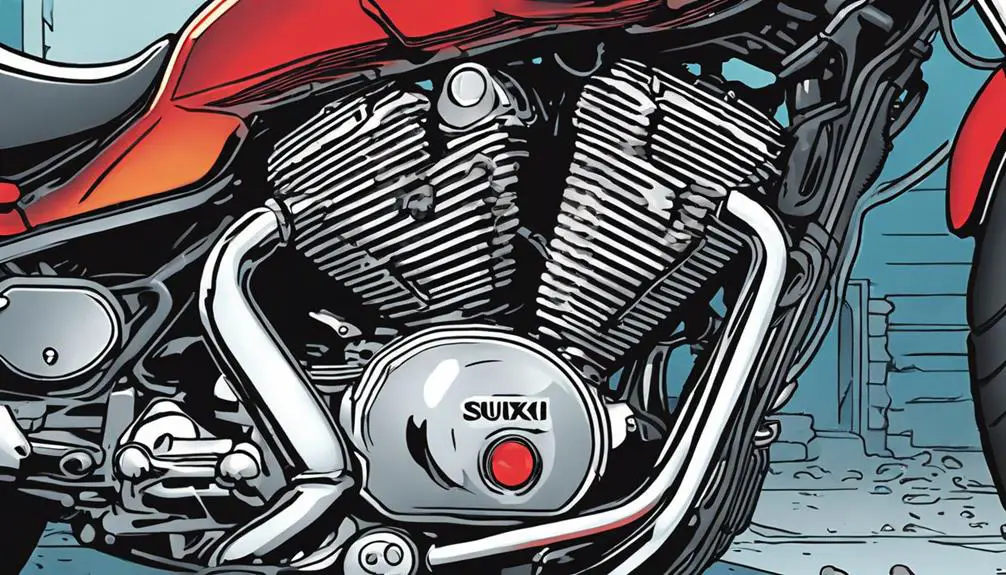
Many riders experience engine overheating issues with Suzuki motorcycles, which can lead to serious damage if not addressed promptly. You might feel the heat rising as you ride, and that's a signal you can't ignore. Overheating can stem from various factors, like low coolant levels, a malfunctioning thermostat, or a blocked radiator. If you notice the temperature gauge climbing higher than normal, it's essential to pull over and assess the situation.
Take a moment to check your coolant level; topping it up could be a quick fix. If that doesn't solve the problem, inspect your radiator for debris or obstructions. You want to keep your ride smooth, and addressing these issues not only protects your engine but liberates you from future headaches.
Regular maintenance is your ally. Flushing your cooling system and replacing old coolant can prevent overheating before it starts. Riding free should never come at the cost of your bike's health.
Stay vigilant, listen to your motorcycle, and don't let engine problems chain you down. Embrace the freedom of the open road by ensuring your Suzuki is in peak condition—you deserve every exhilarating moment of the ride!
Oil Consumption Problems
If you're noticing your Suzuki motorcycle is burning more oil than usual, it's vital to understand the potential causes behind this issue.
You can take proactive steps to prevent excessive oil consumption through proper maintenance and care.
Let's explore what might be causing this problem and how to keep your bike running smoothly.
Causes of Oil Consumption
Oil consumption in Suzuki motorcycles often stems from factors like worn piston rings, valve seals, or engine design flaws.
When your motorcycle's piston rings wear down, they can't seal the combustion chamber effectively, allowing oil to slip past and burn alongside fuel. This not only robs your engine of essential lubrication but can also lead to a decrease in performance.
Similarly, when valve seals become brittle or damaged, oil can seep into the combustion chamber, leading to excess consumption. Engine design flaws can also contribute; certain models may have inherent issues that promote oil leaks or excessive consumption.
If you notice your Suzuki consuming more oil than usual, don't ignore it. It's a sign that something's wrong, and addressing it sooner rather than later can save you from costly repairs down the line.
Understanding these causes empowers you to take charge of your motorcycle's health. Regular checks and being proactive can help you maintain your ride's freedom and performance.
Don't let oil consumption hold you back; stay informed and keep your Suzuki running smoothly.
Prevention and Maintenance Tips
Regular maintenance is essential to prevent oil consumption problems in your Suzuki motorcycle. By staying on top of routine checks and services, you can keep your ride smooth and liberate yourself from the frustration of excessive oil loss.
Here are some key tips to help you maintain your bike:
- Check and change your oil regularly: Keep an eye on oil levels and replace it according to your owner's manual. Fresh oil not only lubricates but also helps eliminate contaminants.
- Inspect seals and gaskets: Worn or damaged seals can lead to oil leaks. Regularly inspect these components and replace them as needed to maintain a tight seal.
Fuel System Failures
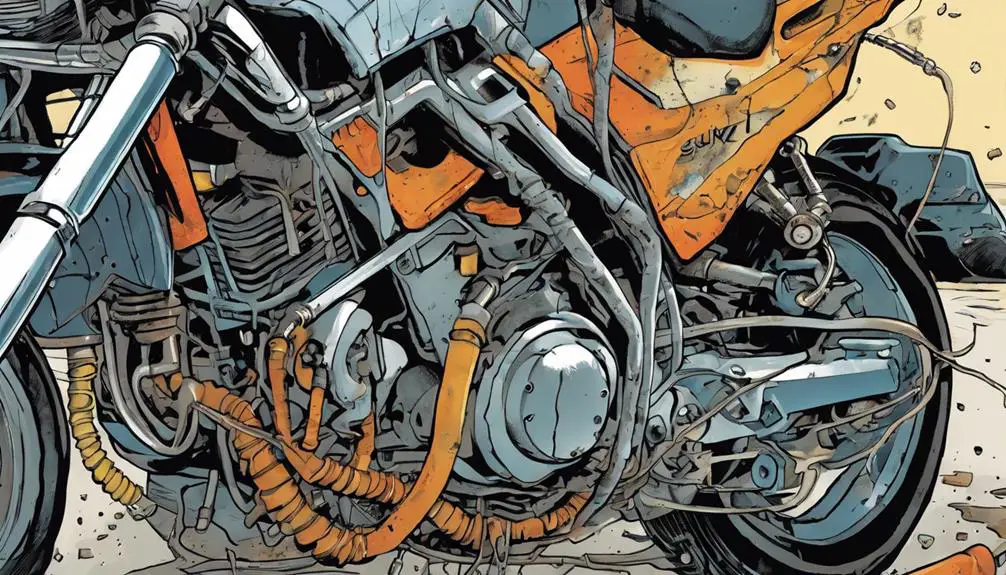
When it comes to fuel system failures in your Suzuki motorcycle, a few key issues can really impact performance.
You might encounter clogged fuel injectors, fuel pump malfunctions, or even contaminated fuel supply.
Addressing these problems promptly can help keep your ride smooth and efficient.
Clogged Fuel Injectors
Clogged fuel injectors can severely hinder your Suzuki motorcycle's performance, leading to rough idling and decreased fuel efficiency. When your injectors aren't delivering the right amount of fuel to the engine, it can feel like you're trapped in slow traffic, unable to release the full potential of your ride.
To keep your motorcycle roaring free, watch out for these signs of clogged fuel injectors:
- Poor acceleration: Struggling to gain speed? It might be time to check those injectors.
- Increased fuel consumption: If you're filling up more often, your injectors could be restricting fuel flow.
Regular maintenance is key to staying liberated on the road. Clean your fuel injectors periodically to prevent buildup from fuel deposits. You can use fuel system cleaners or have a professional service it for you.
Fuel Pump Malfunctions
Fuel pump malfunctions can considerably disrupt your Suzuki motorcycle's fuel system, leading to poor performance and potential breakdowns on the road. When the fuel pump fails, it can restrict fuel flow to the engine, causing it to sputter or stall unexpectedly. You might notice a loss of power, especially during acceleration, which can be frustrating on an open ride.
It's vital to recognize the signs early. If you hear strange noises coming from the fuel tank or if your bike struggles to start, these could be indicators of a failing fuel pump. Trust your instincts; don't ignore these warning signs. You deserve a ride that's smooth and exhilarating.
To maintain your freedom on the road, regular checks and maintenance are essential. Confirm the fuel pump is functioning properly and replace it if necessary. By taking charge of your motorcycle's health, you're not just preventing issues; you're enhancing your riding experience.
After all, every time you hit the road, you should feel empowered, not hindered. So, keep your fuel system in top shape, and reclaim that sense of liberation that comes with riding your Suzuki.
Contaminated Fuel Supply
Contaminated fuel can wreak havoc on your Suzuki motorcycle's performance, leading to a range of fuel system failures that are both frustrating and costly. When you fill up with bad fuel, you risk damaging critical components, which can leave you feeling trapped rather than liberated on the open road.
Here are a few common issues caused by contaminated fuel:
- Clogged Fuel Filters: Dirt and debris can block fuel filters, restricting flow and causing your bike to stall or run poorly.
- Fuel Injector Problems: Contaminants can gum up fuel injectors, leading to uneven fuel distribution and reduced power.
To keep your ride smooth, always be mindful of where you fill up. Using high-quality fuel and regularly checking your fuel system can help you avoid these issues, ensuring your Suzuki remains your ticket to freedom on the road.
Electrical System Malfunctions
Electrical system malfunctions in Suzuki motorcycles can lead to frustrating performance issues, affecting everything from starting the engine to powering essential components.
When your bike fails to start, it might be due to a dead battery or corroded terminals. You'll want to check connections and verify they're clean and secure, as loose connections can rob your ride of the power it craves.
If you notice flickering lights or erratic behavior from your gauges, your voltage regulator could be malfunctioning. This device manages the electrical output, and when it falters, your bike's electrical system can't maintain a stable flow of power. Don't ignore these symptoms; they can escalate into more significant problems, leaving you stranded and yearning for freedom on the open road.
Also, inspect your fuses regularly. A blown fuse might seem minor, but it can disrupt essential functions.
Cooling System Defects
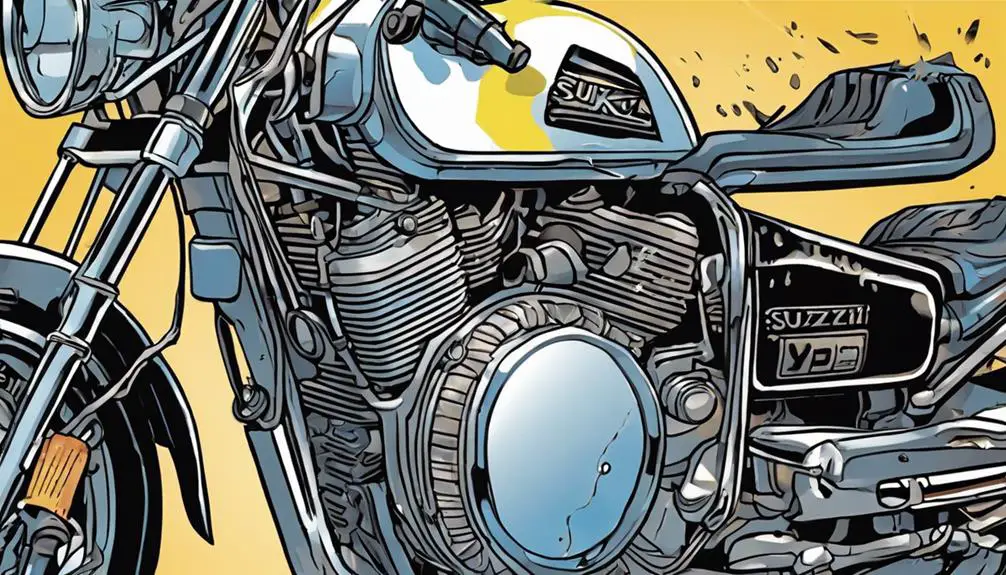
Keeping your Suzuki's electrical system in check isn't enough; you also need to pay attention to the cooling system, as overheating can lead to severe engine damage. A well-maintained cooling system is essential for keeping your ride smooth and liberating.
Here are some common defects you should look out for:
- Leaking coolant: A drop in coolant levels can cause your engine to overheat. Check for leaks around hoses and joints.
- Faulty thermostat: If your thermostat sticks, it can prevent coolant from flowing properly, leading to overheating. Keep an eye on your engine temperature gauge.
Valve Train Complications
Valve train complications can greatly impact your Suzuki's performance, leading to reduced power and increased wear on engine components. When the valve train malfunctions, you might notice issues like poor acceleration, misfiring, or even backfiring. These problems stem from faulty timing, worn out components, or improper adjustments.
It's vital to pay attention to the sounds your engine makes. If you hear unusual tapping or knocking, it could signal that your valve train needs your attention. Ignoring these signs could lead to more severe damage, costing you both time and money.
Regular maintenance is key—check your valve clearances, replace worn parts, and guarantee everything's properly lubricated.
Don't let valve train issues hold you back from experiencing the freedom of the open road. By staying proactive, you'll not only enhance your bike's performance but also extend its lifespan.
A well-maintained valve train will give you the smooth, powerful ride you crave, allowing you to release your spirit of adventure. Remember, your Suzuki is your partner in liberation; keeping its engine in top shape is vital for that exhilarating journey ahead.
Transmission Concerns
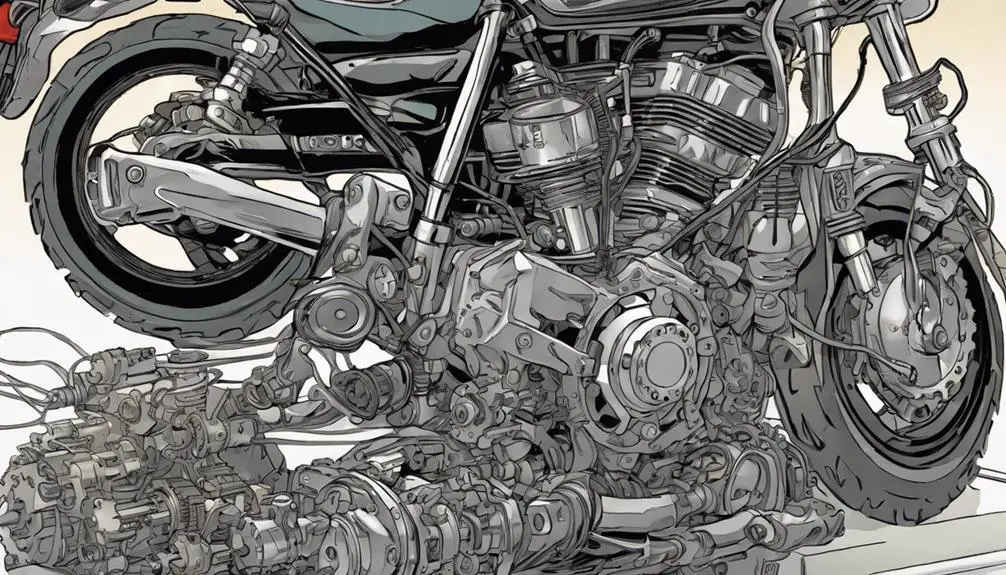
Transmission issues can sneak up on you, affecting your Suzuki's shifting performance and overall ride quality. When you're out on the open road, the last thing you want is to struggle with gear changes or hear those unsettling grinding noises. Recognizing the signs early can save you from a more significant headache down the line.
Here are some common transmission concerns to keep an eye on:
- Difficulty Shifting Gears: If you find it hard to shift, it might indicate a problem with your clutch or transmission fluid.
- Unusual Noises: Grinding or clunking sounds can signal internal wear or misalignment, demanding immediate attention.
Stay proactive! Regular maintenance and checks will empower you to identify and address these problems before they escalate.
Don't let transmission troubles hinder your freedom on two wheels; keep your Suzuki in top shape and ride with confidence. Embrace the spirit of liberation that comes with a well-functioning motorcycle!
Ignition System Failures
Ignition system failures can leave you stranded, making it essential to recognize the warning signs before they lead to a breakdown.
When your Suzuki motorcycle struggles to start or exhibits irregular engine behavior, it's time to pay attention. A weak spark or no spark at all often indicates issues with your ignition coil or spark plugs. Don't ignore that flickering engine light; it's your bike's way of shouting for help.
If you notice a backfire or stalling while riding, you're likely facing ignition problems. The ignition timing may be off, potentially due to a malfunctioning ignition control module, which can disrupt your ride's rhythm. Additionally, keep an eye out for unusual smells or excessive heat from the engine, as these can signal deeper issues.
Regular maintenance can help you avoid these frustrating failures. Check your spark plugs and wires for wear and replace them as needed. Keeping your ignition system in top shape allows you to enjoy the freedom of the open road without unexpected interruptions.
Empower yourself with knowledge, stay proactive, and keep your bike's ignition system running smoothly.
Common Noise Issues
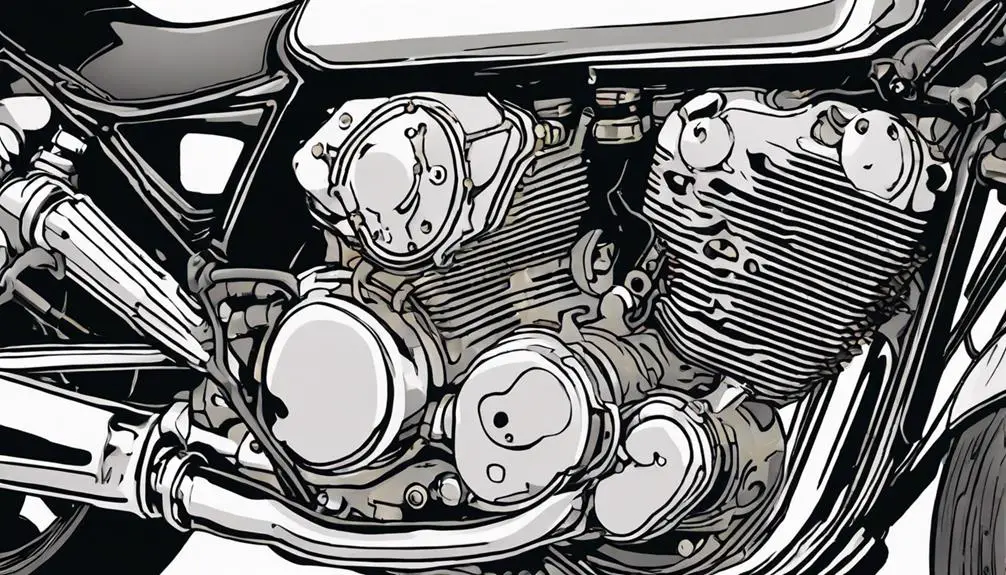
While addressing ignition system failures is important, you might also notice unusual noises coming from your Suzuki motorcycle that can indicate underlying issues. Ignoring these sounds could lead to bigger problems down the road. Here's what you should listen for:
- Tapping or Knocking: This can signal problems with your engine's valves or pistons. It's vital to investigate immediately.
- Loud Exhaust: If your exhaust suddenly gets louder, it might mean a leak or damage to the exhaust system, which can affect performance.
Listening to your bike is important for keeping it in top shape. If you hear any of these noises, don't hesitate. Consult a professional mechanic who understands the unique needs of Suzuki motorcycles.
Common Questions
What Are the Signs of Engine Wear in Suzuki Motorcycles?
When you're checking for engine wear, listen for unusual noises like knocking or ticking, which can signal trouble.
Pay attention to any decrease in power or sluggish acceleration; that's a clear sign.
You should also look for oil leaks or smoke from the exhaust, as these indicate wear and tear.
Regularly inspect the oil condition; dark, gritty oil isn't a good sign.
Staying vigilant helps you keep your ride in top shape.
How Often Should I Perform Engine Maintenance on My Suzuki?
How often do you want your ride to run smoothly?
You should perform engine maintenance on your Suzuki at least every 3,000 to 5,000 miles, or as recommended in your owner's manual.
Regular oil changes, filter replacements, and inspections keep your engine healthy and help you release its full potential.
Don't wait for problems to arise; staying proactive guarantees you can enjoy the freedom of the open road without worries.
Can Riding Habits Affect My Suzuki's Engine Performance?
Absolutely, your riding habits can greatly affect your Suzuki's engine performance.
If you tend to rev high or accelerate aggressively, it puts extra strain on the engine. Smooth acceleration and deceleration can help maintain peak performance.
Regularly checking your throttle response and avoiding excessive idling also contributes to better engine health.
What Is the Average Lifespan of a Suzuki Motorcycle Engine?
The average lifespan of a Suzuki motorcycle engine typically ranges from 50,000 to 100,000 miles, depending on how well you maintain it.
If you ride it regularly and follow the recommended service schedule, you can push that lifespan even further.
Keep an eye on oil changes, filters, and overall care, and you'll enjoy a reliable ride for years.
Are There Any Recalls Related to Suzuki Motorcycle Engines?
Did you know that nearly 20% of motorcycle owners have experienced recalls on their bikes?
When it comes to Suzuki motorcycle engines, there've been some recalls over the years, often related to safety concerns or performance issues.
It's essential to stay informed about these recalls to guarantee your ride remains safe and reliable.
Check Suzuki's official website regularly or contact your dealer to stay updated on any potential recalls affecting your motorcycle.
Wrapping Up
In the world of Suzuki motorcycles, keeping your ride purring like a well-tuned engine is essential.
Picture yourself cruising down the open road, the wind in your hair, and the engine humming smoothly beneath you.
By staying vigilant about common issues—like overheating or electrical glitches—you can avoid the frustration of a sudden breakdown.
Embrace regular maintenance, and you'll guarantee that your motorcycle remains a reliable companion, ready to take you on countless adventures with the thrill of freedom.